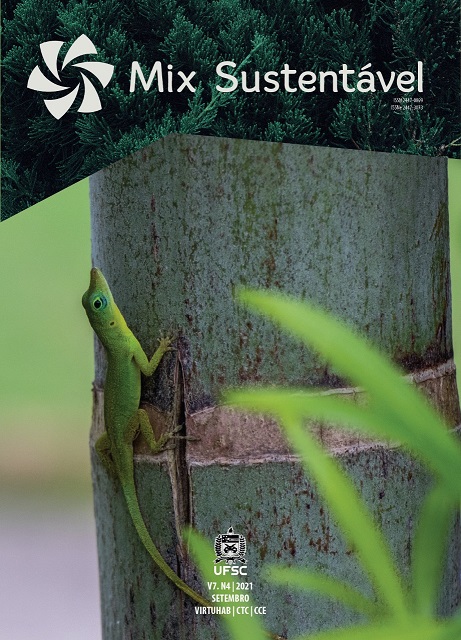SELECTIVE WASTE COLLECTION AND REVERSE LOGISTICS INITIATIVES IN PORTO ALEGRE AS BASIS FOR A CIRCULAR ECONOMY
DOI:
https://doi.org/10.29183/2447-3073.MIX2021.v7.n4.19-30Keywords:
selective collect, reverse logistic, solid waste, circular economyAbstract
One of the strategies for waste reduction is control of discarded materials through collection, disassembly and processing so that it can return as input for industrial processes. With approval of federal law 12,305 in Brazil, manufacturers, importers, distributors and retailers have become co-responsible for the treatment or disposal of post-consumer products, thus incentivizing reverse logistics. In this context, this paper presents the current status of reverse logistics in the country and particularly in the city of Porto Alegre (considered a precursor in Brazil), and reverse logistics initiatives. Even more than 30 years after first introducing its selective waste collection system, the city still needs public awareness and education campaigns for citizens to generate less waste and correctly separate, dispose or return it to producers. Considering the fundamental importance for a circular economy approach, considerable investments in technology, education and waste management are needed so that the benefits of reverse logistics – such as reduced costs and extraction of raw materials, social and environmental responsibility – can be fully enjoyed in the countryReferences
ABRELPE – Associação Brasileira de Empresas de Limpeza Pública e Resíduos Especiais. Panorama dos resíduos Sólidos no Brasil 2018-2019. (2019) Disponível em: https://abrelpe.org.br/panorama/ . Acesso em: 20 out.2020.
AYRES R. U.; SIMONIS. U. E. Industrial metabolism: restructuring for sustainable development. Tokyo; New York: United Nations University Press. 1994. XIV, 376 p.
BNDES - Banco Nacional de Desenvolvimento. Produto 4: relatório final do perfil institucional, quadro legal e políticas públicas relacionados a resíduos sólidos urbanos no Brasil e no exterior. Pesquisa Científica BNDES FEP Nº02/2010 (2010). Disponível em: https://web.bndes.gov.br/bib/jspui/handle/1408/13076 Acesso em: 27 out. 2020.
BRASIL Lei Federal nº 12.305, de 2010. Institui a Política Nacional de Resíduos Sólidos. Disponível em: http://www.planalto.gov.br/ccivil_03/_ato2007-2010/2010/lei/l12305.htm. Acesso em: 20 jun. 2020.
CALDERONI, S. Os bilhões perdidos no Lixo. 4 ed. São Paulo: Editora Humanitas. 2003.
CASTRO, A. Com separação incorreta, baixo preço de venda e ‘coleta clandestina’, Porto Alegre só recicla 6% do lixo. Jornal Sul21, publicada em 7/02/2020. Disponível em https: /www.sul21.com.br/caminhos-do-lixo/2020/02/com-separacao-incorreta-baixo-preco-de-venda-e-coleta-clandestina-porto-alegre-so-recicla-6-do-lixo/> Acesso em: 15 ago. 2020.
CEMPRE – COMPROMISSO EMPRESARIAL PARA A RECICLAGEM. (2020) Artigos e Publicações: Fichas técnicas. Disponível em: <http://cempre.org.br/artigo-publicacao/ficha-tecnica> Acesso em: 25 out. 2020.
COUTO, M. C. L.; LANGE, L. C. Análise dos sistemas de logística reversa no Brasil. Engenharia Sanitária e Ambiental. vol.22 no.5 Rio de Janeiro Sept. / Oct. 2017. Disponível em: https://doi.org/10.1590/S1413-41522017149403. Acesso em: 22 out. 2020.
ELLEN MACARTHUR FOUNDATION Economia circular. 2017. Disponível em: https://www.ellenmacarthurfoundation.org/pt/economia-circular/conceito Acesso em: 07 jan. 2021.
GOLDENBERG, F. O lixo não chega: renda de recicladores cai pela metade nos últimos meses em porto alegre. Jornal Zero Hora, publicada em 29/05/2018. Disponível em: https://medium.com/felipegoldenb. Acesso em: 15 ago. 2020.
GUARNIERI, P. Logística Reversa: em busca do equilíbrio econômico e ambiental. Recife: Ed.Clube de Autores, 2013. 307 p.
GUARNIERI, P.; STREIT- CERQUEIRA, J.A.; BATISTA, L.C. Reverse logistics and the sectoral agreement of packaging industry in Braziltowards a transition to circular economy. In: Resources, Conservation & Recycling 153, 2020.
GUIMARÃES, L. B. D. M. Ergonomia de Produto. (Série Monográfica Ergonomia).Porto Alegre: FEEng/UFRGS, v.2. 2006.
IBGE – Instituto Brasileiro de Geografia e Estatística – (2012) Indicadores de Desenvolvimento Sustentável, 2012. Disponível em: https://biblioteca.ibge.gov.br/visualizacao/ livros/liv59908.pdf Acesso em: 24/10/2020
IBGE – Instituto Brasileiro de Geografia e Estatística – (2015) Indicadores de Desenvolvimento Sustentável, 2015. Disponível em: https://biblioteca.ibge.gov.br/visualizacao/livros/liv94254.pdf Acesso em: 24/10/2020
LESINA, E. Logística Reversa: A saída é pelo caminho inverso. Jornal do Comércio, publicada em 26/11/2018. Disponível em: https://www.jornaldocomercio.com/ _conteudo/cadernos/impresas_e_negocios/2018/11/657441-a-saida-e-pelo-caminho-inverso.html Acesso em: 20 jun. 2020.
McDONOUGH, W.; BRAUNGART, M. Cradle to cradle: remaking the way we make things. New York: North Point Press. 2002. 193 p.
MARCHI, C. M. D. F. Cenário mundial dos resíduos sólidos e o comportamento corporativo brasileiro frente à logística reversa. Perspectivas em Gestão & Conhecimento, João Pessoa, v. 1, n. 2, p. 118 – 135, jul/dez. 2011. Disponível em: https://dialnet.unirioja.es/ servlet/articulo?codigo=4262882 Acesso em: 20 jun. 2020.
NATUSCH, I. Porto Alegre está longe da eficiência em reciclagem. Jornal do Comércio, publicado em 22/08/2017. Disponível em: https://www.jornaldocomercio.com/ _conteudo/2017/08/geral/580827-porto-alegre-esta-longe-da-eficiencia-em-reciclagem.html Acesso em: 15 ago. 2020.
PEIXOTO, B. L. C.; SOUZA, I. G. S.; FERREIRA, K. N. S.; FARIAS, N. M. O.; DANTAS, N. V.; CARVALHO, R. S. S. A logística reversa no Brasil: responsabilidade ambiental e a perspectiva econômica. XI SIMPROD – Simpósio de Engenharia de Produção de Sergipe, novembro, 2019. Anais. P. 164 a 177. Disponível em: https://ri.ufs.br/bitstream/riufs/12570/2/ LogisticaReversaBrasil.pdf Acesso em: 20 jun. 2020.
PREFEITURA DE PORTO ALEGRE - DMLU. Plano Municipal de Gestão Integrada de resíduos Sólidos. Volume 1 – Diagnóstico e Prognóstico. Porto Alegre, 2013. Disponível em: http://lproweb.procempa.com.br/pmpa/prefpoa/dmlu/usu_doc/pmgirs _porto_alegre _volume_1.pdf Acesso em 20 set. 2020.
PREFEITURA DE PORTO ALEGRE - DMLU. Site Departamento Municipal de Limpeza Urbana, 2020. Disponível em: http://www2.portoalegre.rs.gov.br/dmlu/ Acesso em: 20 jun. 2020.
SILVA, C. S.; NASCIMENTO, L. F. M. 25 Anos da Coleta Seletiva de Porto Alegre: História e Perspectivas. Revista Gestão e Desenvolvimento - FEEVALE, V. 14, no. 2, Novo Hamburgo, dezembro, 2017. Disponível em: https://periodicos.feevale.br/seer/index.php/revistagestaoedesenvolvimento/article/view/1135. Acesso em: 20 jun. 2020.
SOUZA, M. T. S.; DE PAULA, M. B.; SOUZA-PINTO, H. O papel das cooperativas de reciclagem nos canais reversos pós-consumo. Revista de Administração de Empresas, vol 52, no. 2, São Paulo, 2012. Disponível em: https://doi.org/10.1590/S0034-75902012000200010 Acesso em: 20 jun. 2020.
VAN DER RYN, S.; COWAN, S. Ecological design. Washington, D.C.: Island Press. 1996. XV, 201 p. p.
ZHENG, J.; MA, G.; WEI, J.; WEI, W.; HE, Y.; JIAO, Y.; HAN, X. Evolutionary process of household waste separation behavior based on social networks. In: Resources, Conservation and Recycling, vol. 161, oct.2020.
Downloads
Published
How to Cite
Issue
Section
License
Creative Commons Copyright Notice
Attribution 4.0 International




